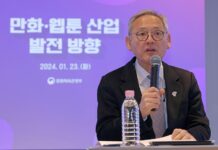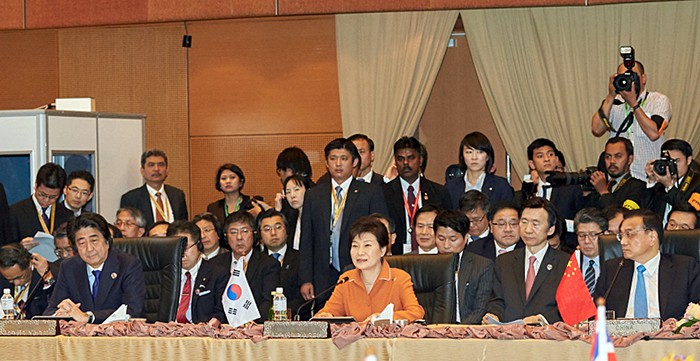

President Park Geun-hye and ASEAN leaders attend the 18th ASEAN Plus Three Summit in Kuala Lumpur on Nov. 21.
President Park Geun-hye has expressed her hope that the Association of Southeast Asian Nations (ASEAN), a community that is pursuing a single market and a symbiotic society enjoyed by about 600 million people, would be the driving force behind regional integration.
“For both ASEAN and the ‘plus three’ countries — Korea, Japan and China — this year is historical, as we can create new engines for strengthened regional cooperation,” said President Park during the 18th ASEAN Plus Three Summit in Kuala Lumpur on Nov. 21. “This new ASEAN Community will give a new breath of fresh air to the efforts to further develop ASEAN economies and will, in turn, boost regional cooperation, too.”
The president laid out three new plans aimed at enhancing cooperation among the ASEAN+3 countries: strengthen functional cooperation among ASEAN+3; implement the follow-up action plan struck by the second East Asia Vision Group (EAVG II); and, lastly, enhance mutual cooperation between Northeast Asia and ASEAN. Meanwhile, she reiterated Korea’s resolve to be part of efforts to help set up this new ASEAN Community.
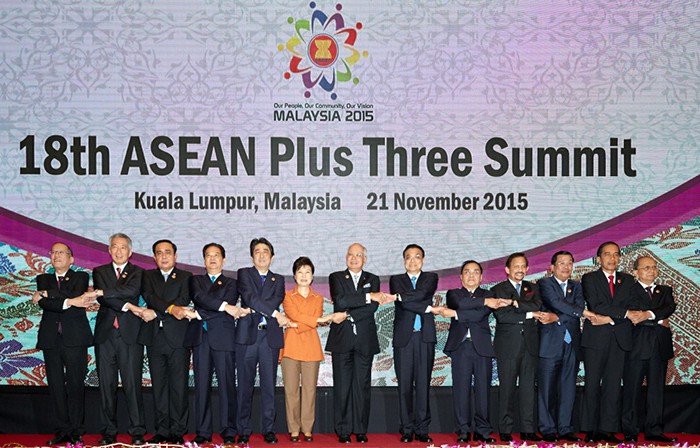
President Park Geun-hye (sixth from left) and ASEAN+3 leaders pose hand-in-hand at the 18th ASEAN Plus Three Summit.
As for issues involving the enhancement of functional cooperation, President Park acknowledged that, “We’ve achieved tangible results in terms of macroeconomics and financial matters, as we have pushed for the expansion of the Chiang Mai Initiative’s multilateralization, as well as efforts to make the ASEAN+3 Macroeconomic Research Office an international organization. Based on these achievements, the ASEAN+3 finance ministers got together in May and adopted the ASEAN+3 New Initiative, a plan aimed at stronger cooperation across the region. Hopefully, this new initiative will help prevent structural risks caused by regional financial instability and also make our economies less vulnerable to external shocks.”
President Park stressed that, “To bring regional cooperation across East Asia to a new level, we should consolidate cooperation among the ASEAN+3 countries and also work together to further enhance ties between the ASEAN+3 states. ASEAN+3 should play a pivotal role in this process, as a platform leading to such interconnections and cooperation.”
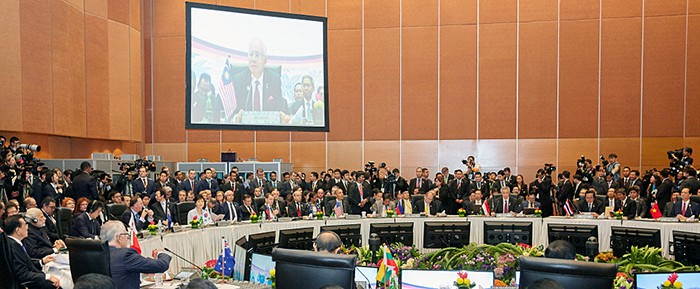
President Park Geun-hye and world leaders attend the 10th East Asia Summit (EAS) in Kuala Lumpur on Nov. 22.
President Park also met with world leaders at the East Asia Summit (EAS) and called on them to help resolve issues surrounding North Korean nuclear weapons. During the EAS, leaders from 16 East Asian countries adopted a joint statement on countering violent extremism.
Regarding territorial disputes in the South China Sea, President Park said, “I hope that all relevant countries contribute to promoting peace and stability in the South China Sea by abiding by what is stipulated in the Declaration on the Conduct of Parties in the South China Sea (DOC) and also that they pledge to not seek militarization.”
She went on to say that, “Korea has a strategic interest in the disputed region as the South China Sea is a key shipping lane through which more than 90 percent of Korea’s energy shipments and 30 percent of its overall exports pass.”
The EAS concluded with the leaders issuing a joint statement on the Regional Comprehensive Economic Partnership (RCEP), under which each country vowed to redouble its efforts to conclude RCEP negotiations by 2016.
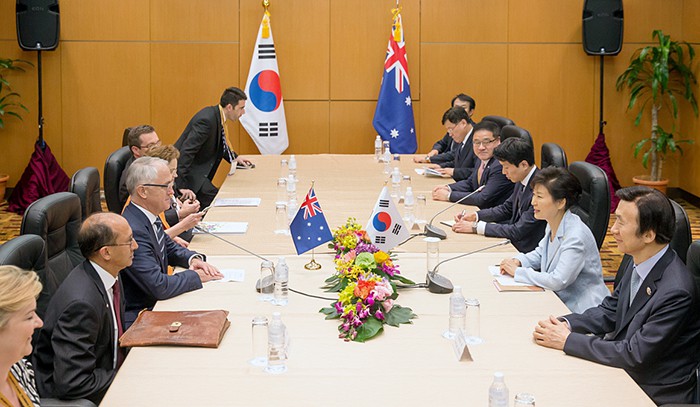
President Park Geun-hye (second from right) holds a summit with Australian Prime Minister Malcolm Turnbull (third from left) in Kuala Lumpur on Nov. 22.
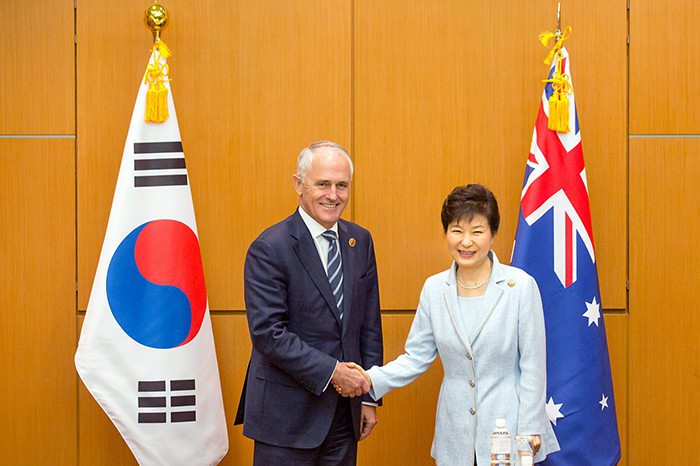
President Park Geun-hye (right) shakes hands with her Australian counterpart, Prime Minister Malcolm Turnbull, during their summit on Nov. 22 in Malaysia.
Following the EAS, President Park held a summit with her Australian counterpart, Prime Minister Malcolm Turnbull. During the talks, President Park stated that, “As part of follow-up efforts to the Korea-Australia FTA, let’s expand our bilateral cooperation beyond the subject of mutual recognition, where each country agreed to mutually acknowledge and authenticate each other’s technical licenses, into other areas, too, such as services and energy.”
As for cooperation across the high-tech field, President Park suggested that, “Our two countries should expand cooperation not only on sharing information involving cybersecurity, but also on sharing cutting-edge high-tech and on conducting joint R&D.”
Finally, in response, the Australian prime minister said, “Korea, Australia and New Zealand hold a meeting on a regular basis that brings together communications ministers from the three countries. Since the cybersecurity issue is just as important, let’s further strengthen our cooperation across this field.”
By Wi Tack-whan, Sohn JiAe
Korea.net Staff Writers
Photos: Cheong Wa Dae
whan23@korea.kr




